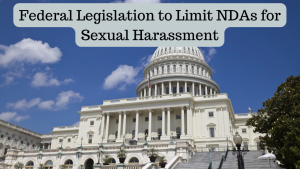Employers will no longer be able to require workers to sign upfront non-disclosure agreements (NDAs) pertaining to sexual harassment incidents they have experienced or witnessed under new federal legislation that passed overwhelmingly through Congress and signed into law by President Biden on December 7.
One operative word here is “upfront.” The Speak Out Act does not prohibit businesses from negotiating for NDAs that cover sexual harassment as part of a court settlement. It simply means that aggrieved employees will need to speak out before filing any potential lawsuit that could lead to an NDA prohibiting them from doing so. The new legislation also does not apply retroactively, so employers that previously had NDAs in place will not suddenly be faced with a flood of public allegations from prior to the legislation’s signing; the prohibition on upfront NDAs applies only going forward.
Currently, an estimated one-third of U.S. workers are bound by an NDA of some sort, but it’s hard to say how many would be able to speak out under the Speak Out Act “because we’re not sure how many workers are actually bound by these kinds of NDAs, primarily because they’re secretive,” according to Julie Roginsky, who cofounded the #MeToo movement activist group Lift Our Voices along with former Fox News personality Gretchen Carlson, and who was recently interviewed by Lisa Desjardins on PBS. But she estimated it will impact “millions and millions.”
Until now, those who experienced harassment or witnessed it could be immediately required to keep mum, Roginsky said. Although she witnessed Carlson’s harassment, for example, “I couldn’t tell her anything I witnessed, anything that I experienced, or even really tell her that she wasn’t alone,” she said. “That was an incredibly heartbreaking moment in my life. Because here you have a young woman who’s coming to you asking for help, and you can’t even tell her why you can’t help her—because my NDA was so broad, I couldn’t tell her I had an NDA.” The new law would not have changed that, Roginsky told Desjardins, because it was signed as part of a settlement. But the other NDA she was once bound to, while working for the campaign of current New Jersey Governor Phil Murphy, would be a different story because she had been required to sign it upfront.
“In that instance, I was a witness to horrible toxicity on his campaign,” Roginsky said. “I spoke to him about it. I confided in him that if he didn’t get it under control, something bad was going to happen. Sure enough, something [allegedly] did happen. A young woman came to me a year later and told me that she’d been sexually assaulted by one of my colleagues. Instead of being able to talk to her about it, I was reminded by Governor Murphy’s attorneys, over and over, that I couldn’t speak to her because I was bound by an NDA.”
The Speak Out Act does not do everything that Lift Our Voices would have wanted, Roginsky said, noting that the activist group would prefer a ban on all NDAs related to toxic workplace issues.
“This bill didn’t go that far,” she said. “What this bill does do is make sure that if you are suffering from sexual harassment, or sexual assault, or if you’re witnessing those things happening to you, or to somebody else, what you’re able to do now Is talk about it publicly before you file a lawsuit, before you actually go to court to state your case. And that’s so important for so many people because they don’t necessarily want to file a lawsuit. What most women, in my experience, want to do is just continue working, but we want to be able to warn others about predators in their midst.”
Or they just want to talk to somebody, but strictly speaking, they’re prohibited from talking to loved ones, friends, trusted clergy or even a therapist, Roginsky said. “What this means is now you can, if you’ve suffered from sexual harassment or sexual assault, and that’s so important, not just from the perspective of a good workplace experience, but also from the experience of just making sure that people are able to get this off their chest and confide in others.”
Further, Roginsky pointed out that New Jersey, California and Washington state have passed laws banning NDAs for all toxic workplace issues, and that, in turn, has influenced employers like Seattle-based Microsoft, which passed a global policy to that effect. “The #MeToo movement is full steam ahead,” Roginsky said.
The Speak Out Act makes pre-employment clauses judicially unenforceable in sexual assault or sexual harassment disputes where the conduct is alleged to have violated federal, state, or tribal law. S.B. 4524 §§ 4(a), 1(6). Although Illinois does not have a similar law, most sexual assault or sexual harassment cases violate feveral law. So employers are advised to check their pre-employment agreements.
 Chicago Business Attorney Blog
Chicago Business Attorney Blog


